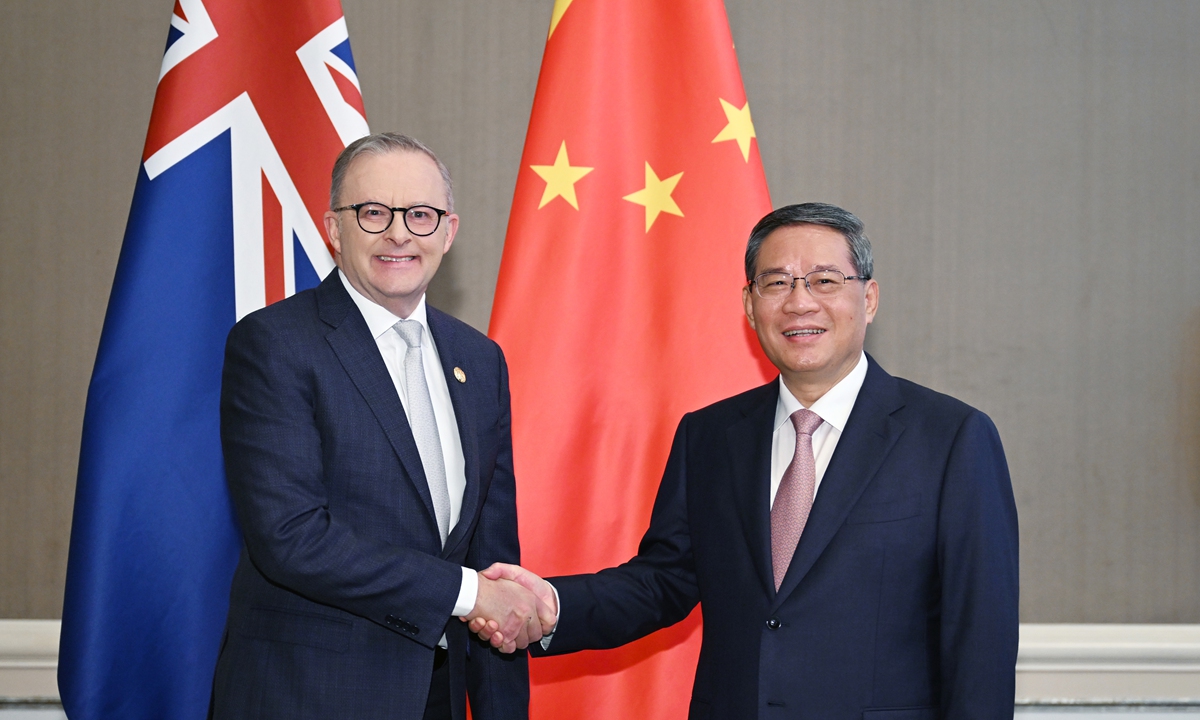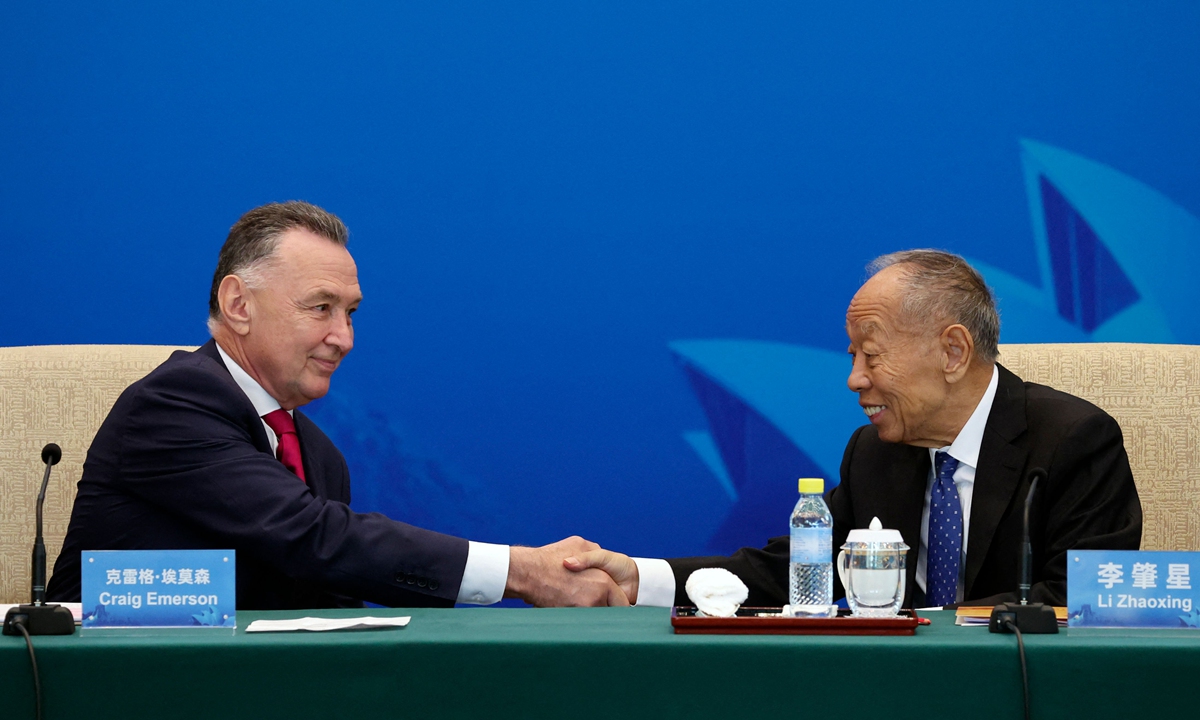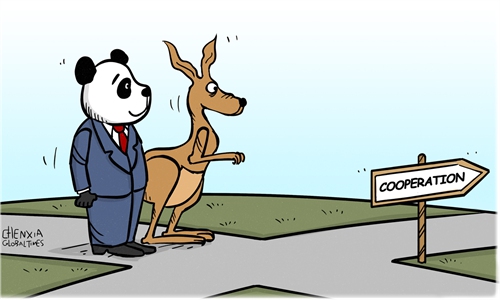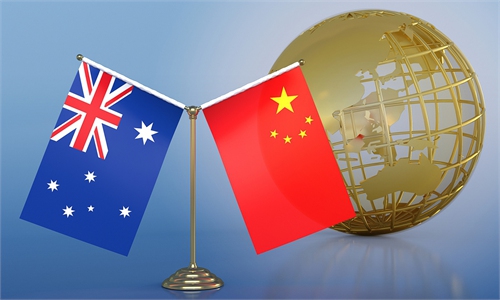China, Australia to seek common ground amid warming ties
First high-level dialogue in three years ‘open, frank and candid’

Chinese Premier Li Qiang meets with Australian Prime Minister Anthony Albanese on the sidelines of the leaders' meetings on East Asia cooperation in Jakarta, Indonesia, on September 7, 2023. Photo: Xinhua
Over the past year, with the joint efforts of both sides, China-Australia relations have maintained a positive momentum of improvement. A sound and stable China-Australia relationship serves the fundamental interests and common aspirations of the people of both countries, Li told Albanese.
China is willing to work with Australia to promptly resume and restore exchanges in various fields, continue to advance dialogues and consultations in diplomacy, trade, education, and consular affairs, providing solid support for the improvement and development of bilateral relations, Li said.
Both sides should handle differences in the spirit of mutual respect, seeking common ground while putting aside differences, and pursuing mutual benefit and win-win. The Asia-Pacific region is home to both China and Australia. China is willing to work with Australia to jointly maintain peace and stability in the region, Li said.
Following the meeting between President Xi Jinping and Albanese on the sidelines of the G20 meeting in Bali, Indonesia, in November 2022, the two sides began resuming the high-level interactions that had brought a significant change from the stalemate that had been in place since 2019 due to Australia's hostile China policy.
Meanwhile, there have been positive signs in the trade cooperation between the two countries, for example, a high-level economic dialogue was resumed in May and most recently, China announced to end anti-dumping and anti-subsidy duties on barley imported from Australia starting from August 5, which is seen as a sign of improving ties.
Australia and China have made progress in returning to "unimpeded trade" and more is needed, Albanese said on Thursday, according to Reuters. He also noted that he would visit China this year, the first by an Australian leader since 2016 if the visit is realized, a confirmation of a significant step in stabilizing ties.
China welcomes Albanese's visit to China at the invitation of Premier Li Qiang, and is willing to work with Australia to make all necessary preparations, Mao Ning, a spokesperson of the Chinese Foreign Ministry, said at a press conference on Thursday.

Head of Chinese delegation Li Zhaoxing and head of Australian delegation Craig Emerson shake hands at the 7th China-Australia High Level Dialogue at the Diaoyutai State Guesthouse in Beijing on September 7, 2023. Photo: VCG
Open, candid talksLi Zhaoxing, Chinese former foreign minister who leads a Chinese delegation to the high-level dialogue, said at the opening of the dialogue that the essence of the China-Australia relations is reciprocally beneficial, and treating China as a threat is a strategic miscalculation.
He also emphasized the crucial role of independence and autonomy in the China-Australia bilateral relationship. "We should take the future of China-Australia relations into our own hands," he said, noting an alliance should not be pitted against partnership.
Australia-US relationship serves its own needs, and China-Australia relationship has its own value. Upholding independence and autonomy is vital for the long-term stability of China-Australian relationship, Li Zhaoxing said.
A full-day dialogue covers four sessions including political relations, trade cooperation, global and regional issues and people-to-people exchanges. The Australian delegation includes Australian industry, government, academic and media representatives led by former trade minister Craig Emerson and former minister for foreign affairs Julie Bishop.
The high-level dialogue between China and Australia has played its role in deepening mutual trust, expanding cooperation and fostering friendship. It is hoped that both sides will continue to make good use of this platform to enhance understanding and friendly sentiments between the peoples of the two countries, bringing new momentum and positive energy to the improvement and development of China-Australia relations, Chinese Foreign Minister Wang Yi told the Australian delegation in Beijing on Thursday.
The twists and challenges of the past few years cannot define the essence of our bilateral relationship, nor can they hinder the pace of China-Australia cooperation, Wang said.
Meanwhile, it's necessary to draw valuable lessons and insights from these experiences. First, we need to view each other objectively, calmly and amicably, refrain from interfering in each other's internal affairs, enhance understanding through communication, and handle our differences appropriately, the Chinese Foreign Minister said.
Second, it's vital to uphold the perspective that China and Australia are partners, not adversaries, and to recognize that China's development presents an opportunity, not a threat, to Australia.
Third, we should independently and autonomously advance the China-Australia relationship, free from the influence or interference of third parties, Wang said.
Dialogue between the two sides is open and candid, and we both emphasized the importance of seeking common ground and putting differences aside, Chen Hong, a representative from the Chinese delegation to the dialogue who is also the director of Australian Studies Centre, East China Normal University, told the Global Times on Thursday.
"When it comes to the trade relations - a cornerstone in bilateral ties, we urged to de-politicize it, and to treat the trade partnership with a rational attitude when there are always disputes existing in global trade," Chen said.
Although there were some differences, both sides have an overall positive outlook for future China-Australia economic and trade relations, especially in areas of cooperation like green and low-carbon development, an expert close to the matter who spoke on the condition of anonymity told the Global Times on Thursday.
In the context of climate change and zero-carbon emissions, traded goods between China and Australia may face adverse structural trends, such as a challenging future for Australian coal exports. Therefore, both sides should plan a blueprint for green and low-carbon cooperation and take action while establishing communication mechanisms, the expert said.
It is also important to change the mindset for problem-solving, abandon zero-sum games, enhance trade engagement, and avoid disengagement in the name of diversification and risk reduction, the expert noted.
And both sides should leverage their current bilateral trade engagement to expand mutually beneficial cooperation. Differences and disputes can and should be resolved through diplomacy and dialogue, he said.
During Li-Albanese meeting on Thursday, China's Premier said China will continue to expand its high-level opening-up to the outside world, providing a larger market for countries worldwide, including Australia.
We hope Australia will adopt an objective and fair attitude toward Chinese companies investing and operating in Australia, he said.
A meaningful, promising step
Some experts said the potential visit of Albanese is a meaningful and promising step for the bilateral relations, especially when the Australian leader needs to resist some domestic pressure including those from certain anti-China forces and overcome the pressure from Washington.
Although there have been positive signs for China-Australia relations, concerns remain for the future stability of the bilateral ties, some experts said.
For example, some attendees to the dialogue raised concerns about Australia's politically driven policy changes, where some "wolverine" politicians seem to use "simplicity" in dealing with "complicated and multifaceted" questions, creating a negative impact or even obstacles for the bilateral relations and even suppressing rational calls for cooperation within Australia, the Global Times learned.
The US has been trying to turn Australia into an important chess piece in its Indo-Pacific strategy, even seeking to transform it into an anti-China weapon through military cooperation such as AUKUS, Chen said.
"It's unlikely to change such close alliance between the US and Australia, but the current Australian government needs to have the sufficient political wisdom to avoid repeating reckless and irrational moves of its predecessor that had sabotaged the ties," he said.




